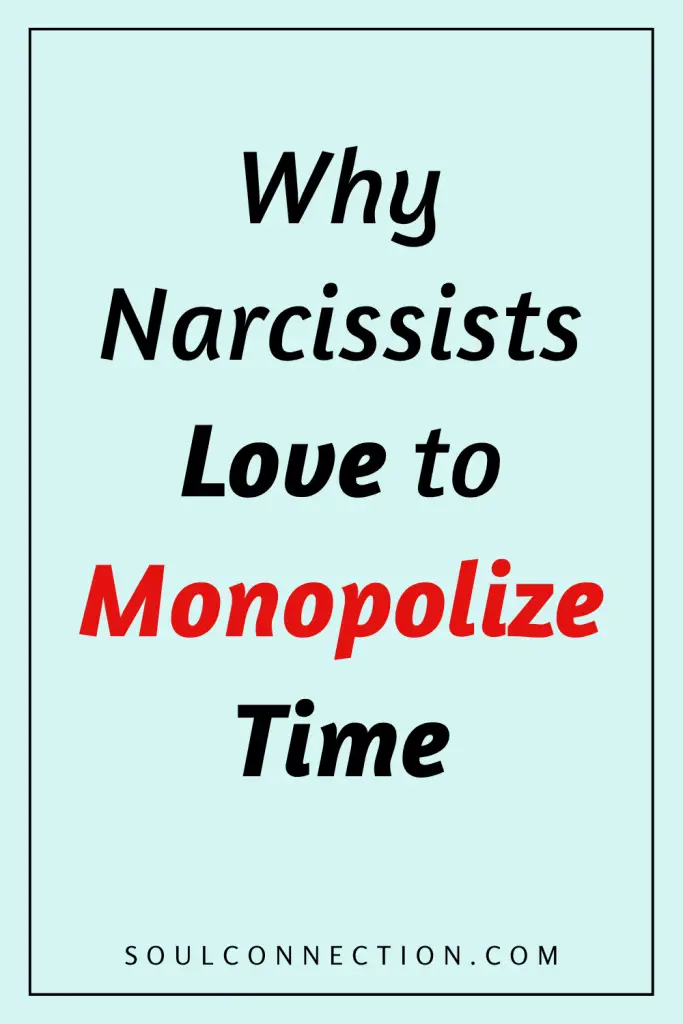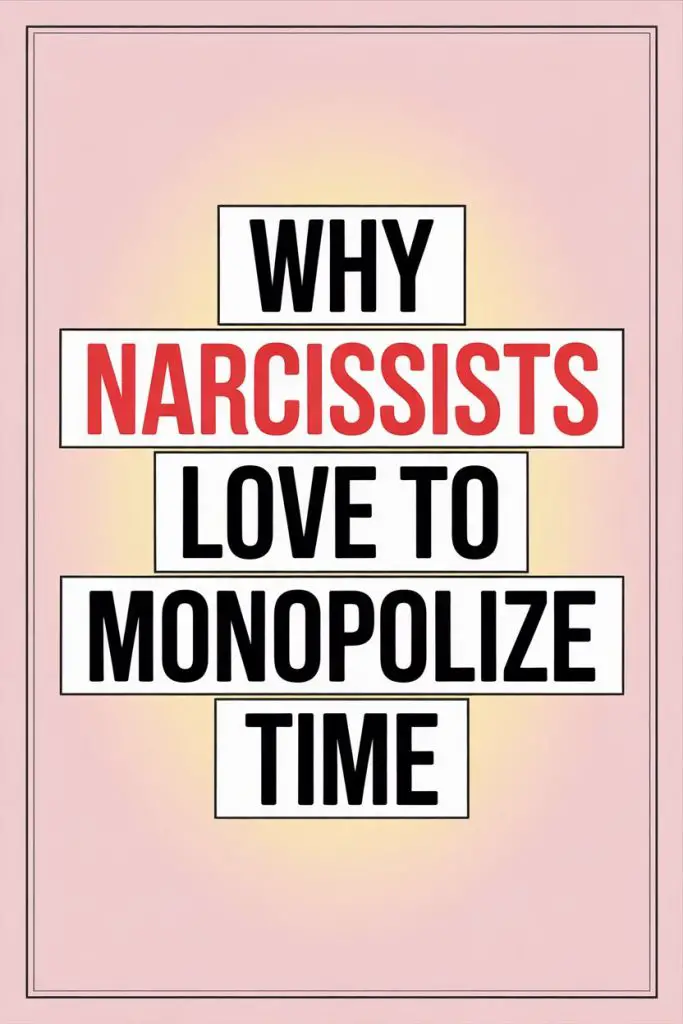Few things can drain your battery quite like spending an evening with a narcissist.
You know the type—every story loops back to them, every victory (yours or theirs) somehow becomes a shining jewel in their own crown, and you’ll likely find yourself clutching a lukewarm drink, trying to calculate if you can escape without faking a sudden case of food poisoning.
They have an uncanny way of stretching a five-minute chat well past its use-by date.
But why do narcissists seem obsessed with hogging time and attention? Are they just allergic to silences, or is there something deeper at play?
Grab your favorite snack (because you’ll need your energy) and let’s unpack the many layers behind this all-too-common narcissistic quirk.
Time as a Source of Narcissistic Supply
Narcissists feed off attention the way most people feed off oxygen. There’s no such thing as “just a quick catch-up” when they’re involved. Time spent basking in the glow of someone else’s focus validates their sense of importance.
Every minute you give, every nod, every laugh at a tired story—these are nuggets of psychological gold to a narcissist. They’re collecting proof that they matter, that you care, and most importantly, that they control the spotlight.
It’s less about the actual subject matter and more about being the main character. If you ever wondered why your narcissistic friend can stretch a story about buying milk into a three-act play, there’s your answer.
Control and Power Plays
Monopolizing time isn’t simply about attention; it’s about control. When a narcissist guides the tempo and content of every conversation, they’re sending a message: “Your time belongs to me.
Your plans? Irrelevant. You are here, now, for my use.”
This power play isn’t always overt.
Sometimes it’s subtle—the lingering phone call that just won’t end, the endless string of texts demanding immediate replies, the dinner that somehow turns into an impromptu therapy session (with you as the unpaid therapist, naturally).
Underneath it all, they’re quietly rearranging the universe so their needs are always front and center.
Avoiding Vulnerability and Silence
Nothing terrifies a narcissist quite like the possibility of being uninteresting or irrelevant. Silence in a conversation? To most, it’s a chance to breathe or think.
To a narcissist, it’s a yawning chasm threatening to expose their emptiness.
Chit-chat becomes a shield. By filling every gap, they avoid introspection or questions about themselves they’d rather not answer.
If they’re doing all the talking, nobody will notice what’s lurking beneath the surface—or ask about the parts of their lives they’d rather avoid.
Trapping Others in Their Orbit
Ever feel like you can’t leave a conversation with a narcissist without them acting personally wounded? That’s intentional. The more time you spend together, the more they can insert themselves into your routine.
This entrapment can be emotional (“You’re the only one who understands me!”), manipulative (“I just really needed someone to listen to me tonight!”), or logistical (“Can we just talk for five more minutes?”—and then it’s midnight).
Over time, your willingness to give up your time becomes a test of loyalty in their eyes.
Inflating Their Own Importance
Nothing says, “I’m a big deal,” like being the only voice in the room. Narcissists love to monopolize group conversations, meetings, and even casual chats because it reinforces their self-appointed status as The Most Interesting Person Here.
If there’s a group dynamic at play, watch as the narcissist tells jokes louder, tells stories longer, and interrupts more often. They’re not just talking—they’re performing.
And if someone else dares to claim the stage? Expect a quick change of subject, a “funny” interruption, or even a passive-aggressive quip to steer things back to their comfort zone.
Evading Accountability
If there’s one thing narcissists dislike more than sharing the spotlight, it’s taking responsibility.
Monopolizing time means there’s less chance you’ll bring up a topic they don’t want to discuss—like that commitment they forgot, the feelings they hurt, or the boundary they ignored.
Why risk an uncomfortable confrontation when you can simply flood the room with anecdotes, distractions, and never-ending chatter? It’s smoke and mirrors, conversation-style.
By the time you get a word in, you’ve both forgotten what you were actually there to discuss in the first place.
Keeping You Off Balance
Long, meandering conversations don’t just waste your time—they leave you mentally frazzled. Narcissists use this to their advantage. The more exhausted or confused you feel, the easier it is for them to get their way.
If you’ve ever left a dinner or phone call feeling slightly disoriented, unsure what was actually accomplished, or even questioning your own memory—congratulations, you’ve experienced the narcissist’s version of conversational chess.
It’s not always intentional, but the net result keeps you coming back, always on the defensive, rarely in control.
Feeding Off Emotional Reactions
Narcissists thrive on emotional energy—yours, not theirs. The longer they keep you engaged, the more they can provoke laughter, shock, sympathy, or even frustration. All of these reactions are forms of attention.
If you notice that your narcissist acquaintance seems to enjoy riling you up, changing the subject when you get bored, or piling on stories until you’re visibly exhausted, that’s not accidental.
Emotional highs and lows are their playground, and they’ll gladly put you through the full ride, front row.
What You Can Do Tonight
Spotting this time-hogging pattern is half the battle. Setting boundaries is the other half. The good news? You can start right now—no need to wait for Mercury to be out of retrograde.
If you’re stuck in a marathon phone call, try the good old “I need to take care of something, I’ll call you back” (and don’t feel guilty if you never do).
In person, glance at your watch, mention early plans, or physically stand up to signal that the chat is over. It’s not rude—it’s self-preservation.
Keep conversations focused. When your narcissist friend starts their third retelling of the time they won the egg-and-spoon race in primary school, steer things back gently.
“That’s wild—sounds like it was a big moment. Did you ever get into other sports?” If they circle back, a firm, “I’ve got to run soon, but I’d love to catch up again another time,” works wonders.
Boundaries don’t have to be dramatic to be effective. Consistency is key. The less you indulge their time-consuming antics, the more they’ll start to get the message. (Will they like it? Probably not. But your sanity will thank you.)
When Time Is Money and Emotional Energy
Monopolizing your time isn’t just a quirk—it’s a way for narcissists to siphon off your emotional resources, bit by bit. Every minute you spend getting steamrolled in conversation is a minute you could be spending on hobbies, friendships, or a proper cup of tea.
You deserve relationships where time is shared, laughter is mutual, and no one needs to fake an emergency just to get out the door. Spotting these time-hogging habits is the first step toward protecting your own well-being.
If the narcissist in your life doesn’t respond to boundaries, it might be time to consider how much access they get to you in the first place.
You can love people from a distance—sometimes, it’s the only way to keep your calendar (and your heart) intact.
Owning Back Your Minutes
No one gets to decide your schedule but you—not your boss, not your family, and definitely not that friend who thinks every conversation should be a TED Talk starring themselves.
If you see these patterns playing out, remember: you’re allowed to prioritize your own time. You’re allowed to bring conversations to a close.
You’re even allowed to change the subject, excuse yourself, or, in dire cases, pretend to get an urgent text from your plumber. (Hey, desperate times call for creative measures.)
Reclaiming your minutes is an act of self-respect, not selfishness.
With a little practice and a pinch of backbone, you’ll find you have more time, more energy, and—best of all—fewer reruns of the Greatest Hits of Narcissistic Storytelling. Isn’t that a future worth talking about?


